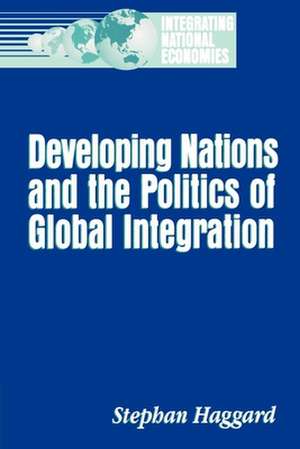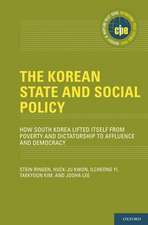Developing Nations and the Politics of Global Integration
Autor Stephan Haggarden Limba Engleză Paperback – apr 1995
Developing countries are becoming important players in the world economy. Although they were slow to liberalize trade, they are now joining the more economically advanced nations in implementing trade reforms and in taking steps to deepen global integration. The lowering of trade barriers and the growth of foreign investment have benefited the developing countries but have also created vulnerabilities, including risks of dependence and political interference. Is deeper integration in the best interest of developing countries?
In this book, part of the Integrating National Economies series, Stephen Haggard examines the position of the developing countries in the international trade regime. Focusing on the nations of East and Southeast Asia and Latin American, Haggard explores the cause of economic liberalization policies in the developing nations. He argues that various international constraints, such as economic shocks and political pressures from the economically advanced nations, pushed developing countries to open up to internatioal competition and to pursue economic relations with advanced industrial states.
Haggard addresses such central questions as: Will developing countries benefit from the deep integration agenda? Will they instead join closed regional blocs that fragment the international economy? Will the developing nations orient themselves toward the multilateral institutions, particularly the World Trade Organization, or will they gravitate toward regional arrangements. Haggard argues that the advanced developing countries have become strong supporters of the multilateral system and that the extent of regionalism has been over stated. He contends that a more serious threat is the lure of biliteralism and the effort of the advanced industrial states to impose standards on developing countries that are inappropriate or politically counterproductive.
A volume of Brookings' Integrating National Economies Series
In this book, part of the Integrating National Economies series, Stephen Haggard examines the position of the developing countries in the international trade regime. Focusing on the nations of East and Southeast Asia and Latin American, Haggard explores the cause of economic liberalization policies in the developing nations. He argues that various international constraints, such as economic shocks and political pressures from the economically advanced nations, pushed developing countries to open up to internatioal competition and to pursue economic relations with advanced industrial states.
Haggard addresses such central questions as: Will developing countries benefit from the deep integration agenda? Will they instead join closed regional blocs that fragment the international economy? Will the developing nations orient themselves toward the multilateral institutions, particularly the World Trade Organization, or will they gravitate toward regional arrangements. Haggard argues that the advanced developing countries have become strong supporters of the multilateral system and that the extent of regionalism has been over stated. He contends that a more serious threat is the lure of biliteralism and the effort of the advanced industrial states to impose standards on developing countries that are inappropriate or politically counterproductive.
A volume of Brookings' Integrating National Economies Series
Preț: 181.63 lei
Nou
Puncte Express: 272
Preț estimativ în valută:
34.76€ • 37.17$ • 28.98£
34.76€ • 37.17$ • 28.98£
Carte tipărită la comandă
Livrare economică 17 aprilie-01 mai
Preluare comenzi: 021 569.72.76
Specificații
ISBN-13: 9780815733898
ISBN-10: 0815733895
Pagini: 210
Ilustrații: black & white illustrations
Dimensiuni: 152 x 229 x 15 mm
Greutate: 0.28 kg
Ediția:New.
Editura: Brookings Institution Press
Colecția Brookings Institution Press
ISBN-10: 0815733895
Pagini: 210
Ilustrații: black & white illustrations
Dimensiuni: 152 x 229 x 15 mm
Greutate: 0.28 kg
Ediția:New.
Editura: Brookings Institution Press
Colecția Brookings Institution Press
Notă biografică
Stephan Haggard is professor of international relations at the University of California, San Diego.
Descriere
Developing countries are becoming important players in the world economy. Although they were slow to liberalize trade, they are now joining the more economically advanced nations in implementing trade reforms and in taking steps to deepen global integration. The lowering of trade barriers and the growth of foreign investment have benefited the developing countries but have also created vulnerabilities, including risks of dependence and political interference. Is deeper integration in the best interest of developing countries?
In this book, part of the Integrating National Economies series, Stephen Haggard examines the position of the developing countries in the international trade regime. Focusing on the nations of East and Southeast Asia and Latin American, Haggard explores the cause of economic liberalization policies in the developing nations. He argues that various international constraints, such as economic shocks and political pressures from the economically advanced nations, pushed developing countries to open up to internatioal competition and to pursue economic relations with advanced industrial states.
Haggard addresses such central questions as: Will developing countries benefit from the deep integration agenda? Will they instead join closed regional blocs that fragment the international economy? Will the developing nations orient themselves toward the multilateral institutions, particularly the World Trade Organization, or will they gravitate toward regional arrangements. Haggard argues that the advanced developing countries have become strong supporters of the multilateral system and that the extent of regionalism has been over stated. He contends that a more serious threat is the lure of biliteralism and the effort of the advanced industrial states to impose standards on developing countries that are inappropriate or politically counterproductive.
A volume of Brookings' Integrating National Economies Series
In this book, part of the Integrating National Economies series, Stephen Haggard examines the position of the developing countries in the international trade regime. Focusing on the nations of East and Southeast Asia and Latin American, Haggard explores the cause of economic liberalization policies in the developing nations. He argues that various international constraints, such as economic shocks and political pressures from the economically advanced nations, pushed developing countries to open up to internatioal competition and to pursue economic relations with advanced industrial states.
Haggard addresses such central questions as: Will developing countries benefit from the deep integration agenda? Will they instead join closed regional blocs that fragment the international economy? Will the developing nations orient themselves toward the multilateral institutions, particularly the World Trade Organization, or will they gravitate toward regional arrangements. Haggard argues that the advanced developing countries have become strong supporters of the multilateral system and that the extent of regionalism has been over stated. He contends that a more serious threat is the lure of biliteralism and the effort of the advanced industrial states to impose standards on developing countries that are inappropriate or politically counterproductive.
A volume of Brookings' Integrating National Economies Series













